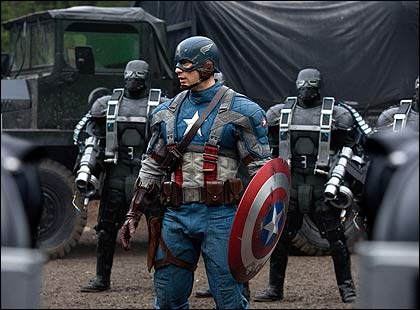
Stars & Studs Forever
The moderate charms of Captain America
by Molly Templeton
CAPTAIN AMERICA: THE FIRST AVENGER: Directed by Joe Johnston. Written by Christopher Markus and Stephen McFeely. Cinematographer, Shelly Johnson. Editors, Robert Dalva and Jeffrey Ford. Music, Alan Silvestri. Starring Chris Evans, Hayley Atwell, Tommy Lee Jones, Hugo Weaving, Dominic Cooper and Stanley Tucci. Paramount Pictures, 2011. PG-13. 125 minutes. Three and a half stars.
 |
When you look at the lineup for next year’s The Avengers, for which Captain America, like Thor, is to some degree a very long preview, you might wonder exactly how Marvel Studios and Paramount are choosing which Avengers get their own films and which don’t. The reason for Iron Man is clear; it started the whole thing off, and there’s nothing to complain about in Robert Downey Jr.’s knowing performance (though there was plenty to gripe about in the inane second film). Why the goofy, musclebound Norse god Thor (Chris Hemsworth) and not Scarlett Johansson’s slinky Black Widow? Why Chris Evans (previously known to comic-movie fans as Fantastic Four’s Johnny Storm) as Captain America and not Jeremy Renner, the more interesting actor, as Hawkeye? Poor Mark Ruffalo, the new Hulk, never stood a chance, not with two underperforming Hulk movies already over and done with.
Not that there’s anything particularly wrong with Captain America, a solid, appealing film that establishes Steve Rogers, the titular captain, as everything a sniveling little twit like Transformers’ Sam Witwicky is not: self-sacrificing, noble, brave, honest, humble, even fairly chaste. It’s WWII, and Rogers just wants to serve his country. His own scrawny body destroys his chances — until Dr. Abraham Erskine (Stanley Tucci, gnawing at a German accent) sees something exceptional and determined in the wee lad, and picks him for an experimental program intended to create super-soldiers.
It’s no spoiler to tell you that Erskine’s program works, and Evans’ digitally shrunken physique turns into the actor’s real self, all strong jaw and the strength to match his noble intentions. Thor could probably still take him in a fight, but Rogers gets a far more appealing love interest: Agent Peggy Carter (Hayley Atwell), who’s faced her own share of career obstacles and can handle a gun as well as a swift retort.
Along the way to battling Johann Schmidt (Hugo Weaving), the bad guy who wants to take over and/or destroy the world, Rogers encounters a small host of characters played by a neat list of entirely game actors. Tommy Lee Jones does his gruff but sympathetic thing as Colonel Chester Phillips; always-charming Dominic Cooper makes an enjoyable Howard Stark, Tony’s pops; Infamous’ outstanding Toby Jones appears as a Nazi scientist given access to some surprising powers. Naturally, Samuel L. Jackson turns up, because Nick Fury needs to recruit Captain America and make our nerdy hearts race for Joss Whedon’s Avengers. (Don’t leave before the end of the credits, mmmkay?).
Director Joe Johnston (The Wolfman) gets Captain America to the goal in good shape, and writers Christopher Markus and Stephen McFeely, to their credit, give us a superhero film in which the female lead doesn’t need rescuing. Markus and McFeely also do a clever thing with a fairly quiet middle portion of the film, when Rogers has become Captain America but not yet a soldier. He’s trotted out on a USO tour, a Hilter-punching, bonds-selling golden boy. The joke, such as it is, is that it works, even as the real soldiers mock the Captain’s tights. The Captain is as effective a symbol as he is a soldier. The glory is less, the humility required much greater, but even as the score booms patriotically and evil soldiers fall in droves, Captain America carries an unexpected reminder that wars are fought in hearts and minds as well as on battlefields.